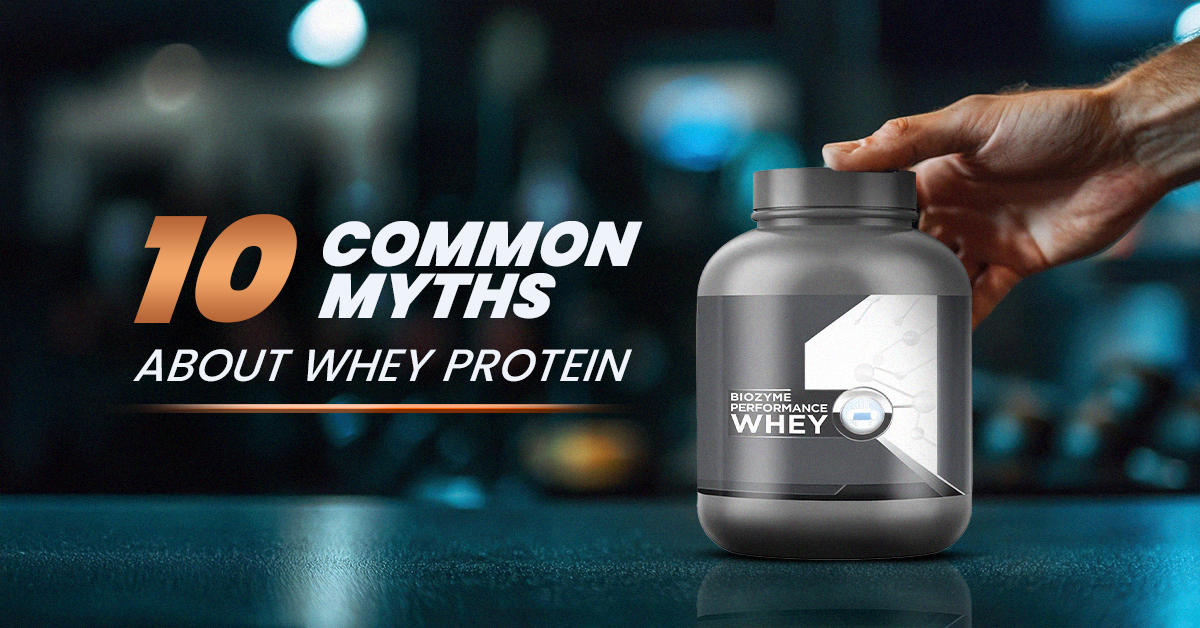
10 Common Myths About Whey Protein You Need to Stop Believing
Among all other protein supplements, whey protein is probably the most consumed by bodybuilders, athletes, and health-conscious people. This will surprise you, but the reality is that many false assumptions about whey protein have deprived people of using this protein for a long time. Here are the top 10 most common myths about whey protein to let you make wise decisions regarding your health and fitness.
Top 10 Myths About Whey Protein Powder:
1. Whey Protein is for Bodybuilders Only
The biggest myth for whey protein is that it's best suited for bodybuilders. It is bodybuilders who need the best whey protein to help add more muscle. Whey protein can benefit anyone in need of a high-quality protein source. It can be from an athlete, a busy professional, or an individual seeking to meet their daily protein needs. That is why whey protein is perfect as an all-around supplement for everyone.
2. Whey Protein Damages the Kidney
This is the most widespread whey protein common myth; people think it damages the kidneys if taken as a nutrient. Scientific experiments showed that healthy subjects can use it without any harm, so long as it is in a prescribed dose, but people having some disorders in the kidney are recommended to have a consultation before taking any sort of protein supplement.
3. It's a Weight Gain Nutrient
Some believe that whey protein leads to weight gain. In reality, whey protein powder can support weight loss by promoting satiety and preserving lean muscle mass during calorie restriction. Weight gain depends on overall calorie intake, not the type of protein you consume.
4. All Whey Protein Powders Are the Same
Many people assume that all whey protein powders are identical, but that’s far from the truth. There are three main types: whey concentrate, isolate, and hydrolysate, each with different protein content and processing methods. Choosing the right type depends on your goals and dietary preferences.
5. Whey Protein is Hard to Digest
Another myth about whey protein is that it's really hard to digest. Of course, a few people who are lactose intolerant might have issues with some of the whey protein products, but most powders are processed so that most of the lactose is removed and, therefore, should not be as bad for most individuals to digest.
6. You Don't Need Whey Protein if You Eat a Balanced Diet
While whole foods should be your first choice for protein intake, whey protein powder is a convenient addition to your diet for those with active lifestyles or increased protein requirements. Whey protein has been useful for many competitive athletes, vegetarians, or those having some difficulty meeting their daily protein requirements.
7. Whey Protein is Full of Harmful Chemicals
Some people do not like the intake of protein supplements because some of the chemicals used are hazardous. Quality-conscious manufacturers ensure quality production; thus, they ensure harmless residue by-products. Always take branded products. If not, look for a known or guaranteed brand. Otherwise, do not buy low-grade protein supplements.
8. Female Should Avoid Whey Protein
It's perhaps the oldest whey protein myth out there - it's bad for women. Based on the fear of "bulking up," where the reality is that whey protein promotes muscle tone, weight management, and recovery, thus being perfect for women.
9. It's Not Safe for Teenagers
Parents get alarmed when teens are taking whey protein. However, active teens who participate in sports will need whey protein powder to meet their high protein requirements. Any supplement should be taken in moderation, and it is always best to check with your healthcare provider.
10. You Can Overdose on Whey Protein
While excessive protein consumption would be stressful over time, recommended daily allowances present no danger in their use. Most people probably will not intake enough protein, anyway, even by adding this whey product to their nutrition.
Conclusion
These myths about whey protein debunk the safety, efficacy, and versatility of whey protein as a supplement to help meet different health and fitness objectives. Be it for enhanced recovery, increased muscle tone, or simply ensuring that daily protein needs are met, whey protein powder is there to support your needs. Let these facts get you closer to choosing the right high-quality protein supplements for your lifestyle rather than myths that can lead you astray. Visit Patanjali Nutrela Nutrition online stores and buy the best-suited whey protein for yourself.














By Nutrela Nutrition
06 Feb 2025
0